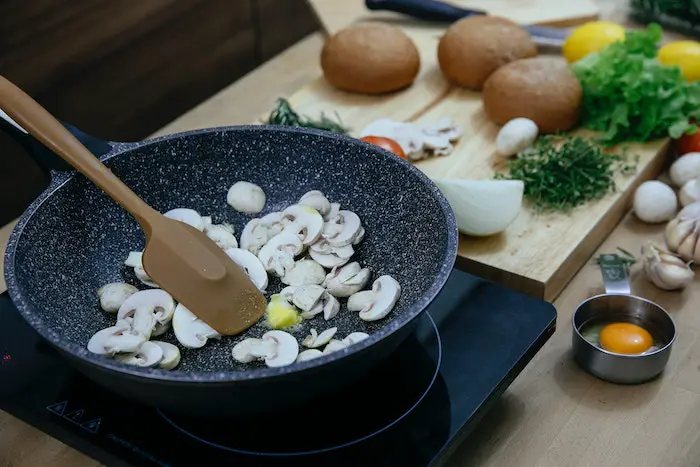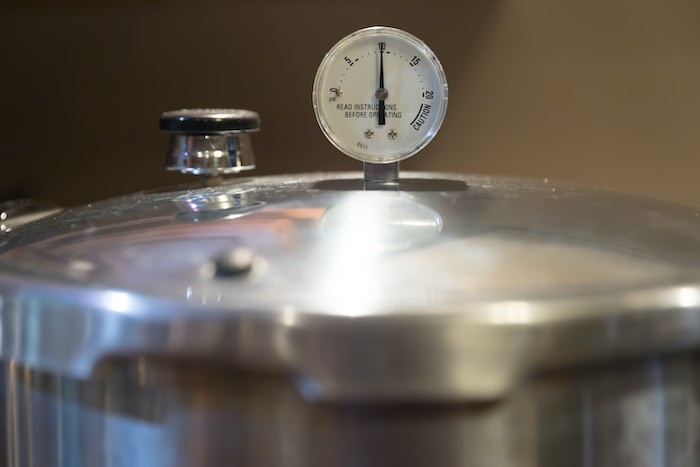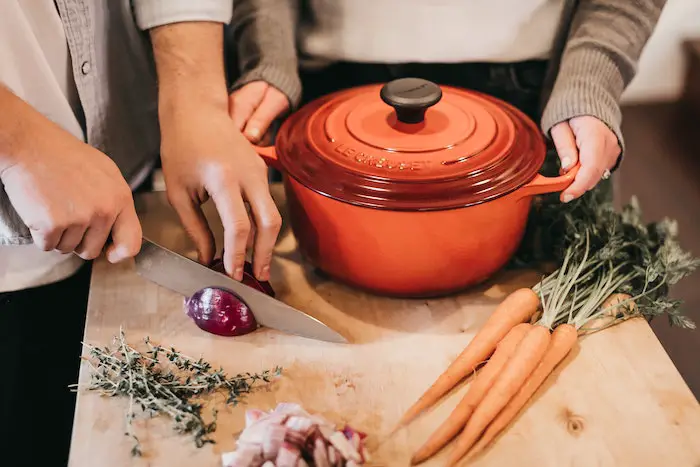Nonstick pans are one of the most helpful kitchen utensils because they are easy to clean and great for not having to worry about stuck food when you’re cooking. Nonstick pans are ideal for frying eggs, making pancakes, and rotating delicate fish slices. However, nonstick pans are also a bit fussy and require more care and attention than you may expect. Can too much oil and fat could ruin your nonstick pan, though? Is it okay to use butter on one of these pans?
Yes, you can use butter for greasing your nonstick pan, but you don’t need a lot of fat or oil to cook with nonstick cookware because these pieces are designed to cook with low amounts of oil. However, if you want to add butter to a nonstick pan, you can certainly do so. Butter and oil do not negatively impact the coating on the pan.
Nonstick pans have a layer of coating that is naturally greasy and slippery, so you don’t need to use too much oil for greasing if that’s why you’re adding it to a dish. If you want to use oil or butter in a nonstick pan to make your food taste better, you may certainly do so.
Taking Care of Nonstick Cookware
If you pay attention to your nonstick cookware, you will be able to enjoy it for a longer amount of time. Nonstick cookware is frequently ceramic or Teflon-coated. These pieces are often lightweight, easy to clean, and the simplest way to cook meals with moderate heat and little oil or fat, too. The nonstick coating makes cooking and cleaning much easier, but nonstick pans require careful care to avoid scratching, peeling, or warping. Here is what you need to keep in mind to take care of your nonstick pans and cookware:
Washing and cleaning your nonstick cookware with soapy water is what is most recommended for these pieces of kitchenware. Scouring pads and hard scrubbing brushes should never be used on nonstick cookware, as they may cause damage to the top coating. You should aways be sure to wash and clean all of your cookware, but in the case of nonstick pieces, you should be careful to avoid scratching or peeling the nonstick coating.
Only use safe utensils with nonstick pans and cookware. Using metal or other sharp utensils when cooking on nonstick surfaces might damage your coating. With nonstick pans, always use plastic with no sharp edges, wooden spoons, or heat-resistant silicone utensils, spoons, and spatulas. You will keep the coating safe for the longest amount of time by making sure you use the right utensils.
If you are dealing with stubborn residue on your nonstick pan, you can use a mild abrasive to scrub this mess off of your cookware. Also, here is another quick tip for you: boil some vinegar and water in your nonstick cookware, let it cool, and then wash it afterward. This can often help you get rid of that stubborn residue without risking scrubbing the pan too hard. You can also use baking soda and water paste to remove the messy residue if it still remains after trying to remove it with vinegar. However, always be sure to be gentle with your cookware’s coating.
Nonstick pans should not be overheated. When cooking, use low to medium heat to help the nonstick coating last longer. Over time, high heat might harm the coating and cause damage to the pan. Never heat a nonstick pan when it is empty. Always be sure to have some food in the pan before turning on your stove.
Please don’t store food in your nonstick cookware. Nonstick pans should not be used to store food for any reason. After cooking, take the time to properly transfer your meals to storage containers if you have leftovers. Acidic foods can also harm the coating if left on the pan for a long time.
Related Questions
Does butter ruin nonstick pans?
No. As an oil or lubricant for cooking, butter is perfectly safe for nonstick pans. The only oil that should be avoided or used with caution is nonstick sprays, as they contain additional chemicals that will damage nonstick coatings. Other oils or fats, such as olive oil or butter, are perfectly safe for nonstick surfaces as long as they are not overheated or heated without any food in the pan.
How often should you season a nonstick pan?
Seasoning a nonstick pan is not a requirement, but those who prefer to do so may season their nonstick pan every few months or even less than this. This may be done by simply adding a small layer of oil to the surface coating to plug any microscopic holes and prevent food from sticking in addition to the nonstick benefits already provided by the nonstick coating.
Having a well-seasoned, nonstick frying pan surface can help decrease the need for extra cooking oil as you continually use the cookware over and over again. Repeating the seasoning procedure will extend the life of your cookware, but there is no set frequency, so it all comes down to your own personal preferences.
Does vinegar ruin your nonstick pan?
Vinegar will not ruin your nonstick pan. However, it actually can help clean up stuck-on residue that is plastered to any nonstick surfaces. If you’re having trouble cleaning your nonstick pan and don’t want to risk any scrubbing damage, add some water and vinegar to the pan and boil them together. Let this cool down, then wash the pan with soap and water. This often help clean up stubborn messes on nonstick cookware without causing any damage.
Is nonstick cookware safe?
Yes, nonstick cookware is safe and is a very popular type of cookware. The only thing you must remember is that your nonstick coating should be free from POFA or perfluorooctanoic acid.
POFA, or perfluorooctanoic acid, is a chemical used to create fluoropolymer coatings. It provides good resistance to heat, oil, stains, grease, and water. However, POFA is linked to many dangerous diseases like cancer. The good news is that after 2013, POFA was banned, and it is now not used as a mineral or component in current nonstick cookware coatings.


